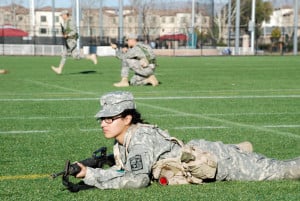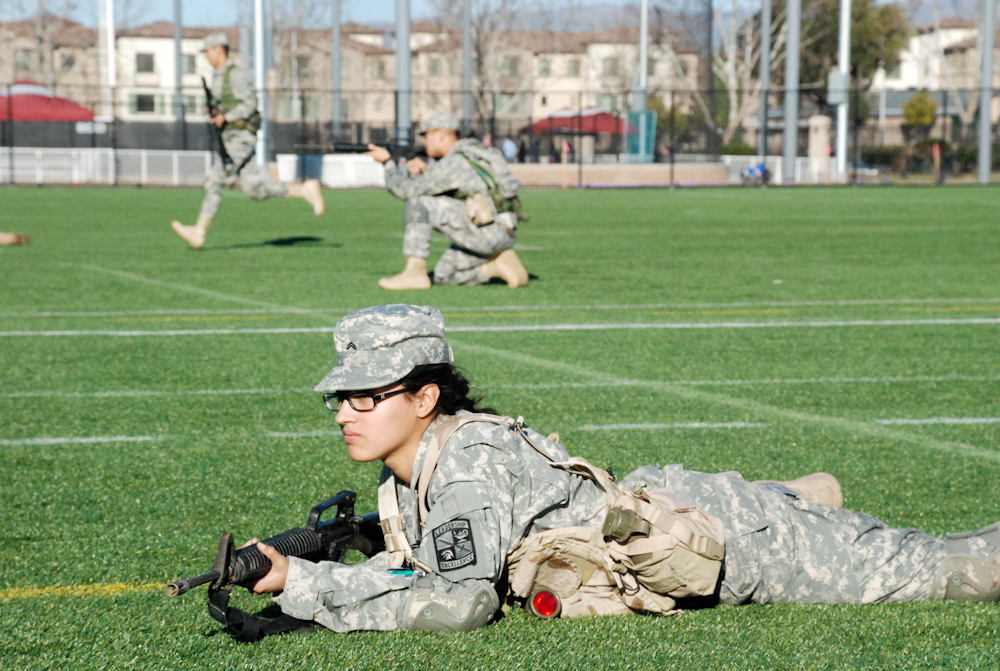Correction: In a previous version of this article, The Daily stated that Haney Hong ’03 had retired from the U.S. Navy. In fact, Hong remains a officer in the U.S. Navy Reserve. The Daily regrets this error.
While the Pentagon’s decision last month to lift its ban on women serving in combat has garnered national attention, the announcement will also directly affect the female cadets of Stanford’s Reserve Officers’ Training Corps (ROTC).

“[In] years past…the closest that any female officer could potentially be to combat [was as a] military police officer,” said Dustin Whidden, ROTC enrollment officer for Stanford and Santa Clara University. “Now this has opened the door for field artillery, armor, infantry — you know, the typical positions that were only allowed for male military officers to be in leadership in.”
Women have been serving unofficially in combat roles throughout the wars in Iraq and Afghanistan, but their work often went without the credit and career advantages that official recognition would have permitted. According to The New York Times, the Pentagon reported that “hundreds of thousands of women have deployed in those conflicts,” with over 800 wounded and 130 killed.
Lauren McCune ’15, an ROTC cadet, expressed excitement about the possibility of serving with an infantry platoon–something that would not have been possible just a month ago.
“The one thing that makes a big difference to me is that I’ll actually be able to be the S2, the strategy [and] risk-assessment officer attached to each platoon, and now I could get to be with an infantry platoon,” McCune said.
When she graduates from Stanford and becomes an active officer in the military, McCune will assume the role of Second Lieutenant, the lowest officer rank, with the ability to seek a position in any branch she chooses.
“If you’re a second lieutenant you’re automatically put in charge of a platoon, so the first day on the job you’re in charge of these 50 people,” said Haney D. Hong ’03, president of the Stanford Military Service Network and an officer in the U.S. Navy Reserve. “The opportunities that have been opened to women are essentially that they can be platoon leaders, at least from the officer’s perspective, of combat arms platoons. From the enlisted woman’s perspective, you can actually be a part of these platoons.”
Hong, who served in the Navy during the integration of women into submarine service, spoke from personal experience about the difference that the ban’s lifting will make.
“This is a great thing,” Hong said. “Number one: by being more inclusive, we’re getting more perspectives on how to tackle a problem, which makes the organization function better, and, speaking in military terms, makes the organization fight better.”
The decision to welcome women into combat roles has its opponents, McCune acknowledged.
“There’s a lot of people who argue — and they make a lot of legitimate points and I agree with them — that you can’t lower the physical standards,” she said. “But as long as they keep those standards the same, I feel like most of those logical arguments about it fall apart. But I do expect there to be a bit more resistance — you’ll just have to have a thick skin.”
Each branch of the military is responsible for putting together its own plan for the policy’s revision, with requirements and exceptions stipulated for each position. On the whole, however, Whidden said that he doesn’t expect the transition to be too contentious.
“Following the elimination of the Don’t Ask Don’t Tell [policy], it wasn’t really too much of a big deal for people in the military,” he said. “It was just the next step.”
If the transition does go smoothly, McCune and her fellow female ROTC cadets can look forward to seeking combat roles when they graduate from Stanford.
“This lifting the ban on women serving in combat makes it so much more clear to me that this is what I’m supposed to be doing right now, that I’m supposed to be out there helping serve my country and give back what I’ve been given, so I’m really excited about it,” McCune said.
